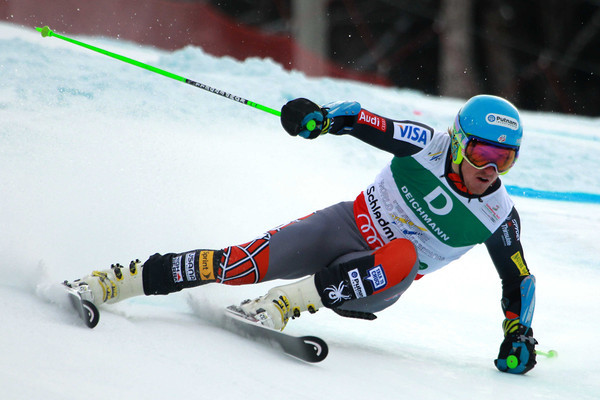Ted Ligety didn't just win the giant slalom Friday at the alpine skiing world championships. He crushed it. Which means that in the way Lindsey Vonn was the It Girl before the Vancouver Olympics in 2010, Bode Miller the It Dude before Torino in 2006 -- America, you are going to be seeing a lot, and then a lot more, of Ted Ligety before Sochi next February.
Ligety's victory made for his third win at the worlds at Schladming, Austria. He already had won the super-G and the super-combined events.
He became the first man to win three titles in a single worlds since the legendary Jean-Claude Killy of France won four in 1968, when the Olympic Games counted as the worlds.
That's 45 years.
Ligety is the first American skier to win three medals at a single worlds. He is the first non-European to do so.
His four career golds match Miller for most by a U.S. skier.
He is the first skier -- male or female -- to win the super-G, super-combined and giant slalom at a single world championship.
He became the seventh man to win the giant slalom at two worlds, and the sixth back-to-back.
All of this means a great deal, and at the same time very little, come Sochi.
It means Ligety, 28, of Park City, Utah, rocks.
Ligety is already an Olympic gold medalist. He won the combined in Torino.
To be hugely obvious, he is now more mature, smarter, better, totally on his game, and barring injury he will be a medal favorite in Sochi in the giant slalom, and perhaps other events as well.
But, because alpine racing is enormously variable, with course conditions, the course set, the light and more, it could all slip away -- literally -- in an instant.
He acknowledged as much Friday, saying, "Ski racing is such a tough sport. In a way -- it's hard to really replicate these kinds of wins. You've seen Lindsey. She was by far the favorite -- won a gold medal, for sure," in the Vancouver downhill.
"She had the ability to win far more. That's just the tough thing about ski racing. It's so far from guaranteed. It's not like running -- all you have to do is run. Or swimming. There are so many more variables than that. It's just so hard to replicate good performances. The hill changes every single guy. So it's not so easy."
Ligety said he is well aware that, for an American audience, he will now be The Guy heading toward Sochi.
"I don't know what it's going to be like," he said, adding in a reference to Vonn before Vancouver and Miller pre-Torino, "I know they had a lot of external pressures, a lot of things they had to go through for being the favorite -- we'll see how that goes. Hopefully, it doesn't take too much out of my summer. It should be fun."
Sochi will be Ligety's third Games. He said, "I'm always looking forward to the Olympics. It's a really cool experience. This has definitely set the bar high. I don't know if this is repeatable," adding the thing was to "maintain the same level of skiing and give myself good chances there."
Ligety admitted to feeling nerves before Friday's racing.
If so, it didn't show.
The giant slalom is a two-race affair.
In the first piece, Ligety went out and built a lead of 1.31 seconds.
In alpine racing, 1.31 seconds is huge.
In the second run, Ligety's primary rival, Austria's Marcel Hirscher, went out and threw the huge crowd -- more than 35,000 people -- into a roar by moving into contention.
"Running 30th," Ligety said, "it was really bumpy in that second run, and the light was pretty flat," adding, "I had to charge. I was making mistakes," including one that almost sent him, his left ski flying, off the course. "But that's part of ski racing. I had to charge through that. I was glad I had that buffer I did after that first race."
Ligety's combined winning time: 2 minutes, 28.92 seconds.
Hirscher finished 81-hundredths back. At one point, Ligety had increased that 1.31-second lead to 1.68, then slowed to make sure he got to the finish in one piece.
Manfred Moelgg of Italy finished third, 1.75 seconds behind.
Tenth place was another second back. Twelfth place was more than full three seconds back of first. In alpine racing, these sorts of differentials are ridiculous.
"This week has been the best week of ski racing in my life," Ligety told a news conference. "I still don't think I have recognized what I have done so far this week. It has been so phenomenal."



